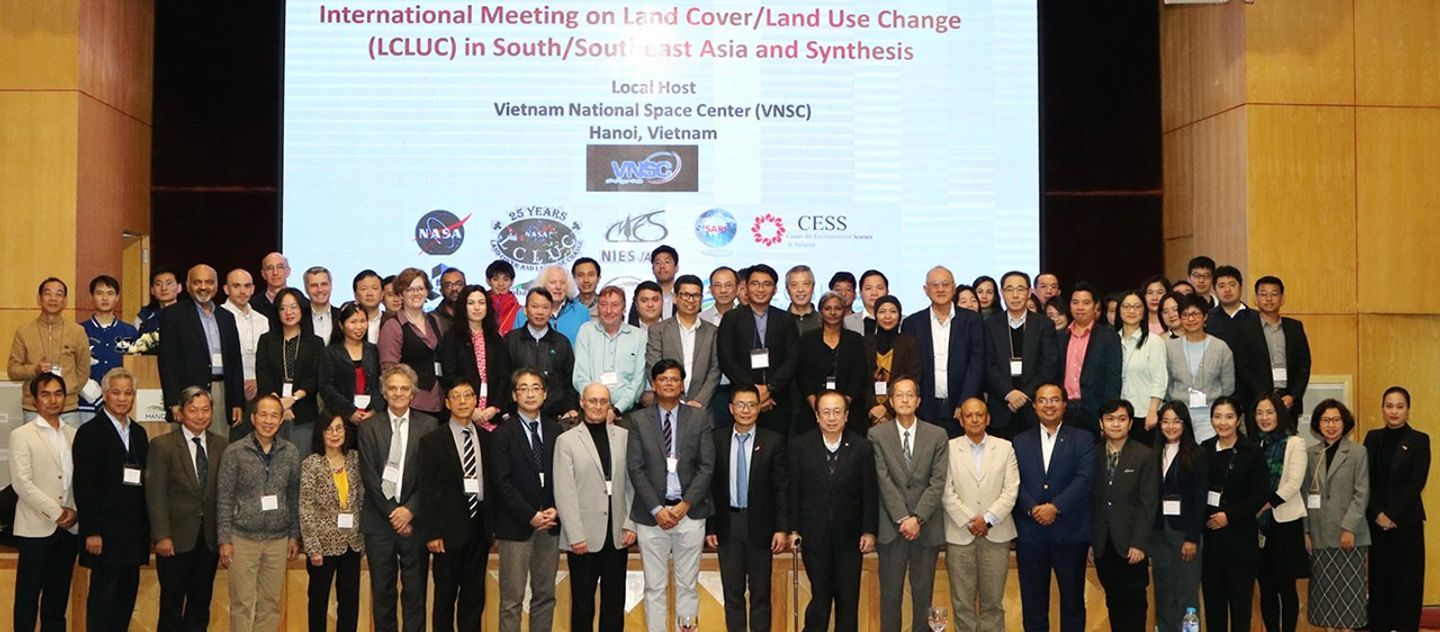
35 min read
Introduction
The NASA Land-Cover and Land-Use Change (LCLUC) is an interdisciplinary scientific program within NASA's Earth Science program that aims to develop the capability for periodic global inventories of land use and land cover from space. The program's goal is to develop the mapping, monitoring and modeling capabilities necessary to simulate the processes taking place and evaluate the consequences of observed and predicted changes. The South/Southeast Asia Research Initiative (SARI) has a similar goal for South/Southeast Asia, as it seeks to develop innovative regional research, education, and capacity building programs involving state-of-the-art remote sensing, natural sciences, engineering, and social sciences to enrich land use/cover change (LUCC) science in South/Southeast Asia. Thus it makes sense for these two entities to periodically meet jointly to discuss their endeavors.
The latest of these joint meetings took place January 1-February 2, 2024, in Hanoi, Vietnam. A total of 85 participants attended the three-day, in-person meeting-see Photo. A total of 85 participants attended the three-day, in-person meeting. The attendees represented multiple international institutions, including NASA (Headquarters and Centers), the University of Maryland, College Park (UMD), other American academic institutions, the Vietnam National Space Center (VNSC, the event host), the Vietnam National University's University of Engineering and Technology, and Ho Chi Minh University of Technology, the Japanese National Institute of Environmental Studies (NIES), Center for Environmental Sciences, and the University of Tokyo. In addition, several international programs participated, including GEO Global Agricultural Monitoring (GEOGLAM), the System for Analysis, Research and Training (START), Global Observation of Forest and Land-use Dynamics (GOFC-GOLD), and NASA Harvest.

Meeting Overview
The purpose of the 2024 NASA LCLUC-SARI Synthesis meeting was to discuss LUCC issues - with a particular focus on their impact on Southeast Asian countries. Presenters highlighted ongoing projects aimed to advance our understanding of the spatial extent, intensity, social consequences, and impacts on the environment in South/Southeast Asian countries. While presenters reported on specific science results, they also were intentional to review and synthesize work from other related projects going on in Southeast Asia.
Meeting Goal
The meeting's overarching goal was to create a comprehensive and holistic understanding of various LUCC issues by examining them from multiple angles, including: collating information; employing interdisciplinary approaches; integrating research; identifying key insights; and enhancing regional collaborations. The meeting sought to bring the investigators together to bridge gaps, promote collaborations, and advance knowledge regarding LUCC issues in the region. The meeting format also provided ample time between sessions for networking to promote coordination and collaboration among scientists and teams.
Meeting and Summary Format
The meeting consisted of seven sessions that focused on various LUCC issues. The summary report that follows is organized by day and then by session. All presentations in Session I and II are summarized (i.e., with all speakers, affiliations, and appropriate titles identified). The keynote presentation(s) from Sessions III-VI are summarized similarly. The technical presentations in each of these sessions are presented as narrative summaries. Session VII consisted of topical discussions to close out the meeting and summaries of these discussions are included herein. Sessions III-VI also included panel discussions, but to keep the article length more manageable, summaries of these discussions have been omitted. Readers interested in learning more about the panel discussions or viewing any of these presentations in full can access the information on the Joint LCLUC-SARI Synthesis meeting website.
DAY ONE
The first day of the meeting included welcoming remarks from the U.S. Ambassador to Vietnam (Session I), program executives of LCLUC and SARI, as well as from national space agencies in South and Southeast Asia (Session II), and other LCLUC-thematic/overview presentations (Session III).
Session 1: Welcoming Remarks
Garik Gutman [NASA Headquarters-LCLUC Program Manager], Vu Tuan [VNSC's Vietnam Academy of Science and Technology (VAST)-Vice Director General], Chris Justice [University of Maryland, College Park (UMD)-LCLUC Program Scientist], Matsunaga Tsuneo [National Institute of Environmental Studies (NIES), Japan], and Krishna Vadrevu [NASA's Marshall Space Flight Center-SARI Lead] delivered opening remarks that highlighted collaborations across air pollution, agriculture, forestry, urban development, and other LUCC research areas. While each of the speakers covered different topics, they emphasized common themes, including advancing new science algorithms, co-developing products, and fostering applications through capacity building and training.
After the opening remarks, special guest Marc Knapper [U.S. Ambassador to Vietnam] gave a presentation in which he emphasized the value of collaborative research between U.S. and Vietnamese scientists to address environmental challenges - especially climate change and LUCC issues. He expressed appreciation to the meeting organizers for promoting these collaborations and highlighted the joint initiatives between NASA and the U.S. Agency for International Development (USAID) to monitor environmental health and climate change, develop policies to reduce emissions, and support adaptation in agriculture. The U.S.-Vietnam Comprehensive Strategic Partnership emphasizes the commitment to address climate challenges and advance bilateral research. He concluded by encouraging active participation from all attendees and stressed the need for ongoing international collaboration to develop effective LUCC policies.
Session-II: Programmatic and Space Agency Presentations
NOTE: Other than Ambassador Knapper, the presenters in Session I gave welcoming remarks and programmatic and/or space agency presentations in Session II,.






